January 2023
High Performance Soil to Transition Global Agriculture and Realize Space Farming
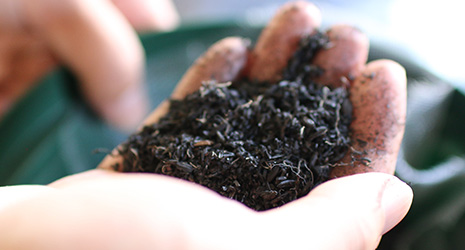
High performance soil 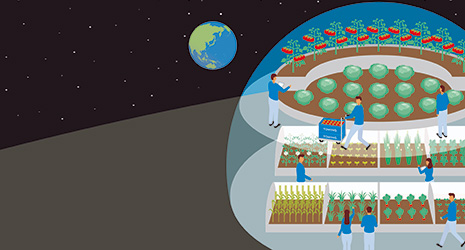
Conceptual drawing of farming on the lunar surface
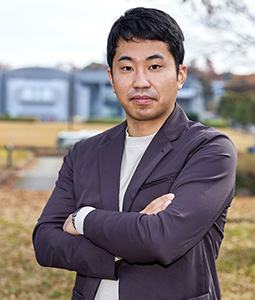
Nishida Kohei, CEO of TOWING, Inc. 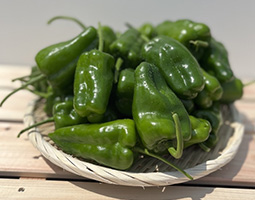
Green peppers grown using high performance soil 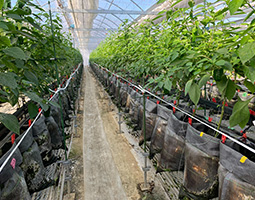
Crop cultivation using high performance soil

A Japanese company has succeeded in creating soil that is suitable for farming in a very short period of time. The technology enables environmentally friendly agriculture in areas with low-quality soil and in future could be applied to grow crops on the surface of the Moon.

As food crises caused by abnormal weather and other factors worsen globally, the realization of sustainable agriculture has become an important issue. It is recognized that farming can negatively affect the environment when chemical fertilizers are frequently used in the pursuit of high productivity. The impact of agriculturally derived greenhouse gases is also regarded as an issue. High performance soil created by Nishida Kohei, CEO of TOWING, Inc., and his employees has gained attention as one potential solution to these issues.
“To create the high performance soil, we use a technique that is very similar to sake* production,” says Nishida. “In sake production, two processes—saccharification (conversion to sugar), whereby starch is broken down into sugar, and fermentation, whereby sugar is broken down to become alcohol—occur in parallel through the activity of microorganisms. Through these processes, sake can be made readily and efficiently. In the same way, high performance soil is created by having various microorganisms working on the soil material at the same time. We can efficiently create quality soil in one month when it normally would take three to five years.”

The basic technology adding and establishing soil microbes onto a porous material** to produce high performance soil was developed by the National Agriculture and Food Research Organization (NARO), an organization dedicated to scientific research related to agriculture. Nishida, who was a graduate student in the Nagoya University Graduate School of Environmental Studies, started a team with members of his laboratory in 2016 to develop and commercialize this technology. After graduating, he founded TOWING, Inc. in 2020 and worked to make the technology practical. His company also succeeded in developing high performance biochar by combining its own unique technology with technology from the aforementioned agricultural research organization. Various microorganisms are simultaneously activated while this high performance biochar is mixed into soil with organic fertilizer. It is then possible to create a bacterial flora that smoothly decomposes organic nitrogen and other components of organic fertilizers into nutrients that plants can absorb, resulting in the creation of high quality soil in an extremely short period of time.
“The high performance biochar is a porous material made from carbonized plant residue (rice husks, bamboo, etc.), livestock manure, sewage sludge, and so on, and the numerous tiny holes on its surface become the microorganisms’ ‘homes’ so to speak,” says Nishida. “However, these homes are not only for microorganisms that work to improve the soil, but can also be inhabited by useless microorganisms. Through repeated trial and error over years, we conducted microorganism culture examinations so that only the microorganisms that promote soil improvement settle to the material.”

TOWING, Inc. has partnerships with Japan Agricultural Cooperatives (JA) across the country, as well as with agribusiness companies in the United States, Brazil, and southeast Asia, and they have begun to work to improve soil in agricultural areas by replacing it with high performance soil.
In agricultural land with improved soil, farmers are able to ensure sufficient yield without the use of chemical fertilizers. They are also able to reduce carbon dioxide (CO2) emissions since rice husks, coconut shells, and other plant residue normally disposed of or incinerated is used as a material for the high performance biochar. And as biochar stores carbon within the soil***, it effectively removes CO2 without being released into the atmosphere. These results have been highly acclaimed both within Japan and abroad, and in 2022 the soil was awarded the Minister of Education, Culture, Sports, Science and Technology Award as part of the STI for SDGs, a program to recognize efforts to solve social issues using STI (science, technology and innovation) conducted by the Japan Science and Technology Agency.

Currently, in addition to improving farmland soil, TOWING, Inc. is working on a space farming project called “Soranou.” The Artemis program****, driven primarily by NASA (National Aeronautics and Space Administration), aims to build a manned lunar base and expand to Mars, and food security has become an unavoidable issue. TOWING, Inc. is part of a JAXA (Japan Aerospace Exploration Agency) working group within the Artemis program that aims to utilize artificial soil in space. As sending food and soil to space from Earth is extremely costly, using lunar soil to cultivate crops would be the ideal way to sustain human activity on the lunar surface over a long period of time. But the particles of sand covering the surface of the Moon are extremely fine and are difficult for microorganisms to inhabit. TOWING, Inc. is working on research to make lunar sand into a suitable soil for the cultivation of crops. By establishing farms on the lunar surface using artificial soil, it would become possible to grow crops on the Moon that can also be consumed there.
The technology to produce high performance soil will be a major force in realizing sustainable agriculture on Earth, and it has the potential to allow for space farming away from Earth, starting with the Moon.
- * Sake is a Japanese alcoholic drink made by fermenting rice.
- ** A porous material is a material with numerous tiny holes.
- *** The carbon left in biochar created by thermally decomposing plant residue and other biomass contains properties that make it difficult to be decomposed by soil microbes. This is why using biochar with soil locks the carbon into the soil.
- **** A manned lunar exploration program which aims to build a base on the lunar surface by 2028.

